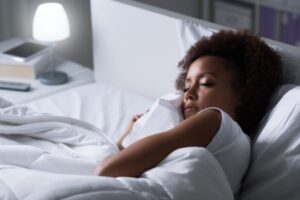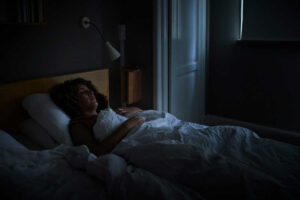Why sleeping in total darkness may be better for your health, A review from Northwestern University Feinberg School of Medicine in Chicago investigates the link between light openings during rest and health gambles. The exploration fills in as a warning for the many individuals living in industrialized countries where light will in general be ubiquitous.

Sleeping while presented to a light at all — even faint light — is linked to an increase in the probability of obesity, diabetes, and hypertension (hypertension) in more seasoned grown-ups, the review finds.
Corresponding creator for the review, Dr. Minjee Kim, of Northwestern Medicine Feinberg School of Medicine, said in a public statement: “Whether it be from one’s cell phone, leaving a TV on short-term, or light contamination in a major city, we live among a bountiful number measure of counterfeit wellsprings of light that are accessible 24 hours of a day.”
“Past creature and a few human investigations have recommended an expected relationship between confounded light — insufficient light during the day, an excess of light around evening time — and obesity,” said Dr. Kim.
“There was little information on light openness designs in more established grown-ups,” said Dr. Kim. “Since more established grown-ups are as of now at increased chance of cardiovascular infections Dow Steadies, NIO Slumps, we needed to know how regularly more established grown-ups are presented to ‘light around evening time’ [or “LAN”], and whether light around evening time is connected with CVD risk factors.”
It isn’t just more seasoned individuals whose health may be impacted by not sleeping in profound darkness.
“In a past report done by our gathering, even one evening of faint light openness during rest raised pulse and blood glucose in youthful, healthy grown-ups who were brought into a rest lab for a short-term explore,” Dr. Kim explained.

“The way that this is seen in more established individuals may address the more combined impacts of such an unthinking relationship, meaning that the unfriendly cardiometabolic impacts of evening light openness may become more clear over the long haul (meaning in further developed age, assuming one maintains such a way of life or openness design over years to many years).”
Not at all like the gathering’s past examination, the new review noticed this present reality impacts of LAN, tracking the rest of 552 more seasoned people.
“In the ongoing review, we estimated light openness and rest in more seasoned grown-ups (ages 63-84) for seven days using a wrist-worn gadget. Instead of bringing these more established grown-ups to the rest lab, we gathered information in their routine surroundings,” said Dr. Kim.
They saw that as not exactly 50% of these more seasoned grown-ups dozed in a completely dark space for something like five hours.
“We were honestly astounded to find out that the greater part of the more seasoned grown-ups were sleeping with some light around evening time,” Dr. Kim said. “Grown-ups who laid down with some light during their rest period were for the most part presented to diminish light.”
The analysts found that the probability of developing hypertension (hypertension) was increased by 74%, obesity by 82%, and diabetes by 100 percent. Members were additionally tried for an increased gamble of hypercholesterolemia, yet no distinction was noticed.
